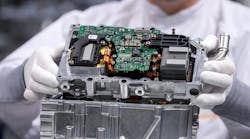Analog Devices Closes $20 Billion Deal to Buy Maxim Integrated
Analog Devices said on Thursday that it closed its more than $20 billion deal for Maxim Integrated, cementing its largest-ever deal as it looks to expand its product offerings for both the automotive and industrial markets.
The deal creates an analog semiconductor giant with more than 50,000 products and a global customer base of around 125,000, giving it the scale to become a more formidable foe to Texas Instruments. The deal, which raises its annual revenue to the $9 billion range and free cash flow to $3 billion, also bolsters its position in the automobile sector and further extends its footprint on factory floors and in consumer and medical electronics.
“With more than 10,000 engineers and the increased breadth and depth of our best-in-class technologies, we are well-positioned to develop even more complete, cutting-edge solutions for our customers," said Vincent Roche, president and CEO of Analog Devices, in a statement. Under the terms of the combination, Maxim's shareholders swapped every share of common stock they owned for 0.63 shares of Analog's common stock.
The combined company, with a market value of more than $61 billion, is starting out amid a global shortage of chips that has ravaged the global electronics supply chain for more than half the year. The automobile industry has been hit the hardest, unable to get enough chips to keep factories open. The shortages are even starting to drive up the costs of personal computers and other consumer goods as chips become more and more scarce.
Analog Devices said the deal, which required regulatory approval in the US, China, and other jurisdictions, will open up new opportunities for its suite of power management chips, data converters, and other analog chips. Analog Devices said it plans to roll out more complete offerings with Maxim's chips, giving it more ways to win slots in the markets it is targeting. It also plans to use cross-selling to increase its share of the analog market.
The buyout brings together the No. 2 and No. 3 players in the market for standard, non-custom analog chips, giving it a broader range of technologies to take on Texas Instruments, the leader in analog semiconductors.
For Analog Devices, increased scale could give it more power over the prices of its components as well as the leverage to get more guaranteed wafer supplies from external foundries. These contract chip firms have been loaded with orders for months as consumer electronics giants fight with the auto industry for scarce supplies. Foundries fell behind on expanding production last year amid large swings in demand due to the coronavirus.
A wave of consolidation has been sweeping through the US semiconductor landscape, upending the industry as soaring demand for consumer electronics and cars has dragged out semiconductor shortages for months.
The demand has driven up shares in many semiconductor firms, giving them the financial muscle to do deals. Nvidia, which has overtaken Intel as the most valuable semiconductor maker in the US, agreed last year to pay $40 billion for Arm, in what will be the industry's largest deal if it gets the green light. The proposed deal landed a month before AMD said it would buy programmable chip giant Xilinx in an all-stock deal valued at $35 billion.
Also last year, Marvell agreed to buy Inphi for $10 billion in cash-and-stock, adding to its arsenal of networking chips for data centers and 5G infrastructure, deepening ties to customers in the cloud and telecom segments.
Analog Devices is also gaining Maxim's hordes of electrical engineers in the deal. The combined company will start with more than 10,000 engineers. The competition for analog engineering talent has been rising in recent years. Analog Devices said the deal would put it in a better position to lure skilled engineers. "Together, we will drive the next waves of analog semiconductor innovation," Roche, Analog's CEO, said in a statement.
As part of the deal, Analog Devices said Maxim's former president and CEO Tunc Doluca, and former Avago Technologies CFO Mercedes Johnson are joining its board of directors. They previously served on Maxim's.
Analog Devices has said it should be able to reduce its costs by $275 million a year within 24 months of the deal closing.

